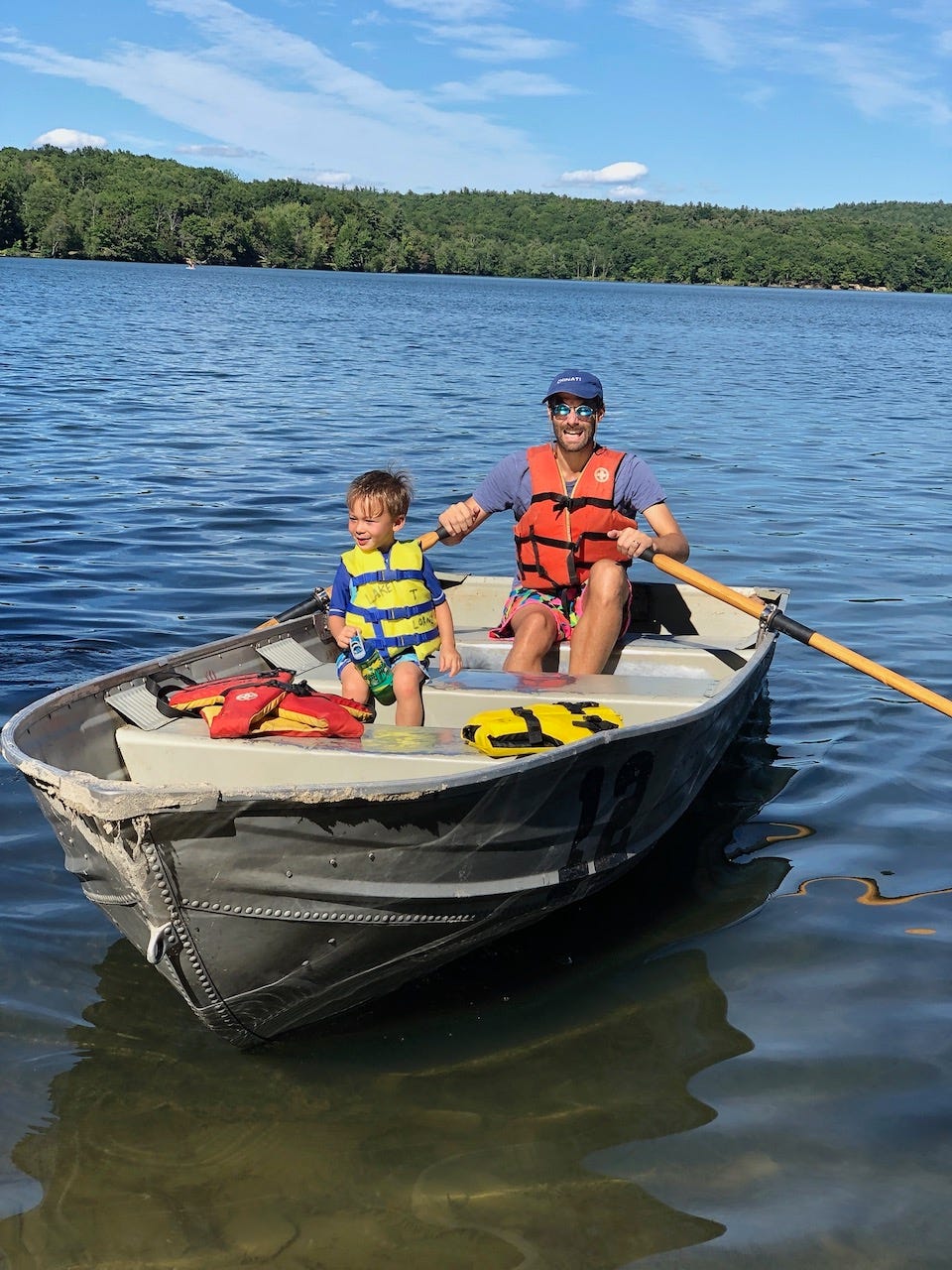The Monday Media Diet with Scott Norton
On FT Weekend, the Secret Life of Groceries, and Sámi huts
We first heard about Scott Norton (SN) from our pal and legendary hotelier James Mcbride. We cold pinged him on the Lean Luxe Slack to contribute an MMD. We’re pleased to say he has over-delivered in a great way. -Colin (CJN)
Tell us about yourself.
I'm Scott Norton, best known professionally as the co-founder of Sir Kensington's, makers of condiments with character. I'm now an investor in consumer businesses through the firm I started called N+1 Ventures. We back creative founders that shape culture and technology enabling those brands to grow. The name N+1 stands for language and mathematics on equal footing.
I tap dance to work because my job gives me a birds-eye view into companies without the tremendous responsibility of being a CEO myself anymore, and also because my job is to be a learning machine. I'm an information packrat, a dot connector, and a human switchboard. It's inspiring to work with so many talented entrepreneurs.
My wife Cara and I recently moved to Los Angeles with our two little kids. Before that, I lived in NYC for 10 years. I love both cities and think being bi-coastal is the only truly civilized way to live, but I haven't quite unlocked that.
Describe your media diet.
Let's start with what I physically read (the healthy diet) because the on-screen stuff (junk food) is just too plentiful.
Every weekend I get a nice pink copy of the FT Weekend delivered, which pretty much takes me the whole week to finish. Occasionally I get shipments of Apartamento, National Geographic, Noble Rot (for wine nerds), and Little White Lies (for film nerds). I used to get The Economist physically delivered for many years and I would keep stacks and stacks of it around because I couldn't bear throwing it because I didn't want to miss any *one* article that might change my life or awaken me to something really important. It was actually an unhealthy scarcity mindset and I switched to getting the Economist digital edition only. I love the Economist and think it's pretty much the sharpest news analysis out there but hardly ever read it anymore because there's no visual trigger lying around anymore.
My favorite National Geographic articles to read are the mountain climbs like this one. Into Thin Air is a powerful book in that genre. Here is a list of my favorite books from 2020.
In terms of on-screen, I like Airmail (s/o to Bill Keenan), Monocle Weekend Edition so I can pretend I'm urbane, Craig Mod's Roden Explorers, the WSJ app, Lean Luxe of course, and I'm hopelessly addicted to Twitter (@swhnorton). I also like annual shareholder letters as a genre, and of course, Berkshire Hathaway has some great ones.
As for Podcasts, I am a fanatic for Revisionist History and the back catalog of Reply All which are absolutely sensational. I don't watch much TV though I love documentaries such as Narco Cultura, The Great Happiness Space, Crip Camp, and Alphago. Love A24's movies and the Safdie Brothers, especially Uncut Gems and its prototype film (if I may call it that) Good Time, which are both high octane thrillers dripping with pathos. It's my dream to be a filmmaker and last year we got to debut a film at Tribeca Film Festival that we helped produce at Sir Kensington's called Fries!.
What is the last great book you read?
The Secret Life of Groceries by Benjamin Lorr. It will be eye-opening to anyone who wants to learn about where food really comes from, though it was particularly powerful for me to learn about how challenging it is to be a long-haul trucker in America. Long Haul truckers are mostly independent contractors who get paid by the mile driven, and then face all sorts of deductions and penalties that they have to pay the agency they're working for. Also, getting paid by the mile driven, means they don't get paid during all the waiting they do loading, unloading, and sitting in line at distribution centers. It's a brutal industry, though if you think about it, every single thing you eat was brought to you on a truck.
What are you reading now?
A bootleg copy of Breakthrough Advertising which is a cult classic about persuasive writing that goes for $400 used on Amazon. Like how all major religions have the same behavioral tenants at their core, all schools of thought in marketing arrive at the concept of enabling your customer to sculpt their own identity through your product.
What's your reading strategy when you pick up a print copy of your favorite publication?
I learned long ago that you have to read by process of elimination given the incredible volume of interesting media available. So with the FT or the Economist, I scan the paper for what might be interesting and rip it out and save it, and then recycle what's less interesting. This way I've "processed" the paper and can have a stack of what I'm really interested to read.
By habit, I also use what I read to connect with people. I can't naturally help but think "oh, Christina would find this interesting" and take a picture of the article and send it to her. It's both a way of saying "you're on my mind" and also "let me support your interests." The habit probably comes from my own mother leaving lots of articles on my desk when I would come back from college.
Who should everyone be reading that they're not?
Min Jin Lee is an excellent author, and everybody ought to read Pachinko, which is a transportive, impeccably researched, multi-generational historical fiction thriller that begins in Japanese occupied Busan. That was my favorite book of the past few years.
What is the best non-famous app you love on your phone?
My favorite app is called Captio, and all it does is let you type a note and click a single button to email it to yourself. I use it probably a dozen times a day. If I need to take a note or remember to do something, it stresses me out if I don't write it down and file it in my inbox for later. It's part of David Allen's GTD methodology. I recently met the two founders of the app who are Dutch software developers and it was like meeting The Beatles.
Plane or train?
Is that even a question? Train. I love the romantic little world that trains put you on. Nothing beats eating breakfast in a cafe car and sipping coffee while looking out the window. And unless you're on Amtrak's northeast corridor, a train always leads you somewhere interesting. Tokyo's Shinkansen, the Grand Trunk Express through India, the Chinese railway from Xi'an to Tibet, the Trans-Siberian RZD from Krasnoyarsk to Ulan Ude, London to Brussels on the Eurostar, Zurich to St. Moritz, hell, even Berlin to Leipzig is great. I've done so many memorable train rides and love every one.
What is one place everyone should visit?
Ok, here's a deep cut. Do yourself a favor and reserve one week to hike the first 100km of the Kungsleden during July or August in the far north of Sweden, within the Arctic Circle. You hike hut to hut, finish each day with a woodfired sauna and brisk dip in the river, and the sun never sets because you're so far north. It's probably the best trip my wife and I have ever done and we've been to a lot of places.
(Sámi hut on the Dag Hammarskjöldsleden outside Abisko, Sweden)
Tell us the story of a rabbit hole you fell deep into?
My friend Woody and I would often spend our Sundays in college riding around Providence on our bicycles and regaling each other with stories of our (then limited) travels. That gave us the idea to travel around Asia on a folding bicycle, which we did twice, once in 2010 for a 10-month journey spanning 23 countries. I can’t even begin to tell you about the adventures and misadventures we had. We went to many places that would be challenging to visit now from both a political and security perspective including Syria, Russia, and Xinjiang in Western China - and those three were some of our favorite places. You can read about it on Asiawheeling.com. (SN)
YA book of the day:
WITI contributor Scott Stedman, who explored the different genres of murder fiction in our Murder Mystery Edition, has just published his debut YA mystery, Mouse. It's the story of a young hacker who uses code like magic and has been hailed by Wired Magazine's Jeff Howe as, "A riveting, thrilling, and wildly imaginative novel."
--
WITI x McKinsey:
An ongoing partnership where we highlight interesting McKinsey research, writing, and data.
A playbook for navigating inflation. Few executives have faced the challenge of leading a company through an inflationary spike like today’s. Lessons from strong leaders and bold action can help CEOs make the decisions that only they can make. Here’s how.
–-
Thanks for reading,
Noah (NRB) & Colin (CJN) & Scott (SN)
—
Why is this interesting? is a daily email from Noah Brier & Colin Nagy (and friends!) about interesting things. If you’ve enjoyed this edition, please consider forwarding it to a friend. If you’re reading it for the first time, consider subscribing (it’s free!).






